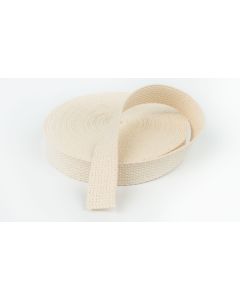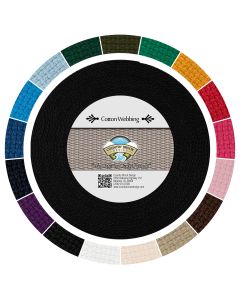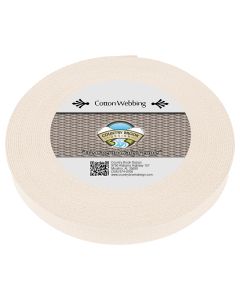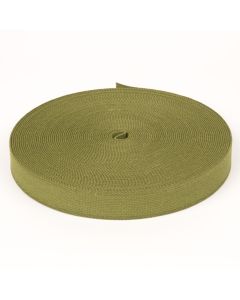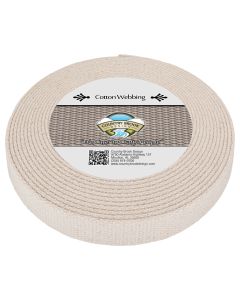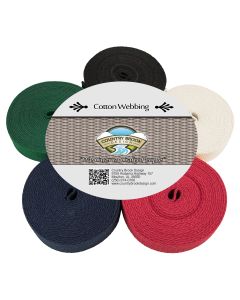Cotton Webbing
Cotton Webbing is Natural, Breathable, and Comfortable
Cotton, a natural fiber, is often preferred over synthetic materials like nylon or polyester for several reasons, particularly comfort, environmental impact, and breathability. Each of these aspects makes cotton a compelling choice for those who prioritize natural, soft, and breathable fabrics in their clothing, bedding, or home textiles.
Comfortable Cotton
First, cotton’s comfort is unparalleled. Cotton fibers are soft and hypoallergenic, making them suitable for all skin types, including sensitive skin. Unlike synthetic materials, cotton rarely causes skin irritations, and it naturally feels soft and smooth against the skin. This is partly because cotton fibers come from plants and have a less abrasive structure than synthetic fibers. Many people find cotton more comfortable for everyday wear, especially in items that are in constant contact with the skin, like T-shirts, underwear, and bedsheets. In contrast, synthetic materials like nylon and polyester can sometimes feel rough or plasticky, particularly after extended wear. They can also create static electricity, which cotton does not, adding extra comfort to cotton’s appeal.
Just Breathe
In terms of breathability, cotton is the clear winner. Cotton fibers are porous, allowing air to flow easily through the fabric, essential for hot climates or any activity that causes you to sweat. Cotton's breathability prevents moisture buildup, helping regulate body temperature by wicking sweat away from the skin. Conversely, synthetic fibers like nylon and polyester are less breathable and can trap heat and moisture, causing discomfort and increasing the risk of skin irritation or rashes. The breathability of cotton makes it especially desirable in warm weather and during physical activities when sweat is more prevalent. Many folks prefer cotton for athletic and casual clothing because it keeps them cooler and more comfortable.
It's Just Natural
From an environmental standpoint, cotton is a natural and renewable resource, while synthetic fibers are petroleum-based and have obvious ecological impacts. While cotton farming has environmental impacts, particularly regarding water usage and pesticide application, sustainable cotton farming practices, such as organic cotton, have gained traction. Additionally, cotton is biodegradable, meaning it decomposes over time, unlike synthetic fibers, which can take decades or centuries to break down, contributing to long-lasting pollution if not recycled. For environmentally conscious consumers, cotton’s renewable and biodegradable qualities are significant advantages over synthetic options.

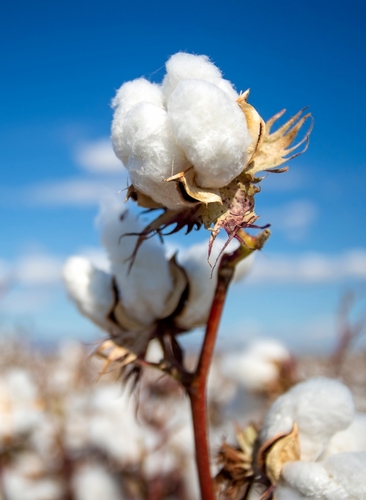
Explore Cotton Webbing For Your Crafting Project
When strength isn't your top concern, Country Brook Design® offers cotton webbing as an environmentally friendly alternative to synthetic webbing. Woven from pure cotton fiber, these cotton webbing belts are breathable and comfortable without the slick feel of a synthetic. Choosing cotton webbing material is good for you and for the planet!
- Naturally breathable
- Absorbs moisture and sweat quickly
- Non-chafing
- It won't irritate sensitive skin
- Made from eco-friendly fibers
Carol's Tip: With cotton webbing, note that tensile strength cannot be measured due to natural fiber variations. Also, if you need cotton webbing straps that aren't spliced, please let us know so we can address your request!
 Review and Win! Share your verified review and get a chance to win a $25 store credit!
Review and Win! Share your verified review and get a chance to win a $25 store credit! 
